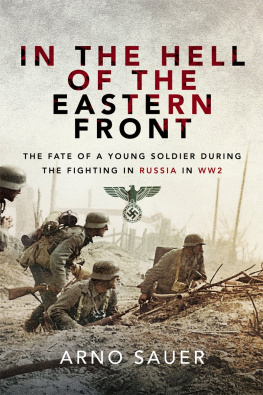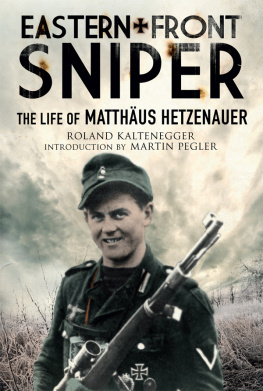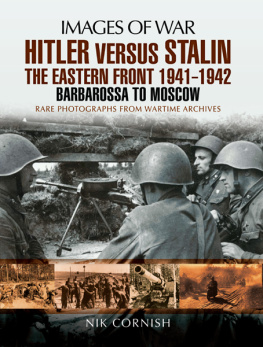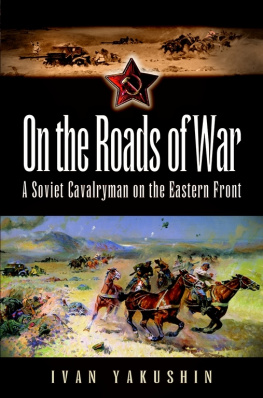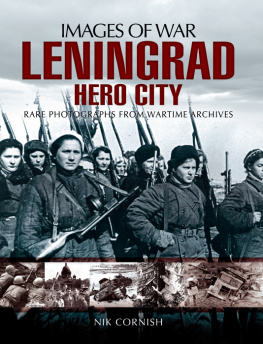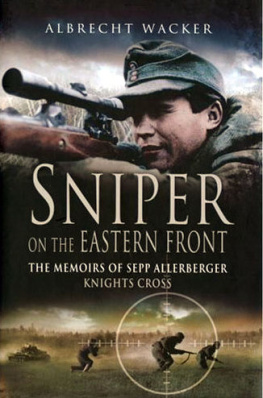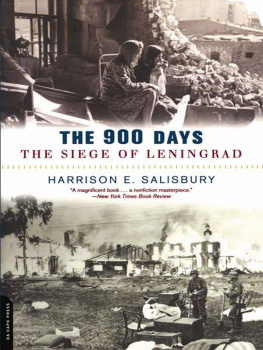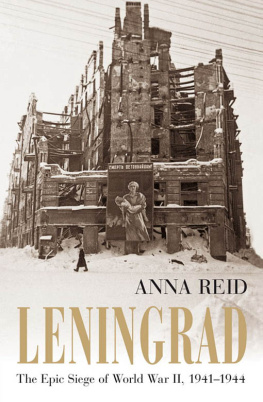Red Sniper
on the
Eastern Front
The Memoirs of Joseph Pilyushin
Joseph Pilyushin
Edited by
Sergey Anisimov
Translated by
Stuart Britton
My First Shot at the Enemy
Leningrad...
The streets and squares were filled with sunshine; golden spires gleamed brightly against the blue sky, and the gardens and parks were alive with fresh greenery and colour. I had seen all these things many times, but now the beauty of my native city seemed especially attractive.
At noon on 23 July 1941, together with other new recruits I was marching through the streets of Leningrad towards the front, in the direction of Narva. We gazed at the streets, buildings and parks and silently said goodbye to our homes and families. The Narva Gates receded into the distance, but still we kept glancing back at the city.
Immediately upon arriving at our destination, we became part of the 105th Separate Rifle Regiment, which was assembling in an attractive little village. That same night, our company was assigned to man combat outposts. We headed off towards the banks of the Narva River. The commanders and Red Army men strode silently, keeping their weapons at the ready.
Private Romanov and I picked our way through some low undergrowth along the banks of the river. Petr was moving in front of me so stealthily that not a single branch rustled and not a single dry twig snapped beneath his feet. Whenever my head or shoulder brushed up against some bushes or an incautious footstep broke a twig, Romanov would stop, turn around and whisper through his teeth, Quiet!, wrinkling his broad forehead in consternation.
Reaching the place that our commander had designated, we lay down beneath a low-growing willow. Below us, the water was flowing in a broad current.
The mysterious silence of the woods was unsettling, and our ears pricked up at any soft rustle. Everything around me seemed unusual; even the starry sky seemed to be suspended just above the tips of the pine trees. The birds had long ago fallen silent; only somewhere in the rye, something was repeating a monotonous call: Peets-polots, peets-polots, peets-polots...
A thin shroud of morning fog slowly rose above the river and meadows. On the edge of the woods, concealed among the overgrowth, a field dove began its mournful call: Ooo-ooo. A magpie began to warble in a birch grove. A squirrel, its head tipped to one side, looked down on us with its bright little eyes and loudly chattered while hopping from branch to branch.
At dawn, our company commander Senior Lieutenant Kruglov showed up. He dropped down onto the grass next to Romanov without taking his eyes off an isolated cottage on the other riverbank. The home seemed to be empty and abandoned: the windows and door had been boarded up.
Suddenly I saw a gate in the fence that surrounded the yard slowly open. A tall woman emerged, stopped, and looked around. She was dressed in a long black skirt and a blouse with unusually wide stripes. A yoke lay across her shoulders, with a basket of laundry hanging from each end. The woman walked directly across a field to the river. Reaching the bank above the river, she placed one basket on the grass, and with the other slowly made her way down to the waters edge.
Gazing at the woman, I thought of my native Belorussia. There were many times when my own mother had hoisted a yoke with baskets onto her shoulders, and headed for the Sorianka River to wash the laundry. Where is she now? I asked myself. Has she remained in German-occupied Belorussia, or did she manage to leave with the other refugees? With pain in my heart I thought of my family, which I had recently left behind in Leningrad: What are my wife and children doing now? How are they?
I recalled the early morning in June, when a messenger from the district recruitment centre [ raivoenkomat ] had knocked on my apartment door and handed me a summons to appear immediately at an assembly point. I quickly gathered my things and stopped in front of the bedrooms closed door. I badly wanted to see my wife and children one more time, and have a quick talk with them before my departure. I took hold of the doorknob... but stifling my internal emotions, I released it and strode resolutely away from the room.
Kruglovs soft voice interrupted my reflections: Comrades, for some reason this woman isnt hurrying to do the laundry. Take a look at her.
Kruglov crawled on his belly to the edge of the woods. The woman was standing on the bank, and shading her eyes from the sun with her hand, she was looking towards our side of the river. Romanov and I took a close look at her face: Romanov through his binoculars, and I through the tele scopic sight on my rifle. The face was long and somewhat gaunt, with a sharp nose and chin; the closely-spaced eyes reminded me of a foxs.
Apparently satisfied, she squatted down, pulled a thin cord with a weight on one end from the basket, and deftly tossed it into the water. Then with one hand she grabbed an article of clothing from the basket and slowly began to wash it. Meanwhile, she carefully wound the end of the cord around her other hand; as soon the weight appeared, she immediately tossed the soaked piece of clothing into the basket, stuck the cord down her blouse and left the riverbank. Glancing one more time in our direction, she easily lifted the yoke with the baskets and hastily returned to the cottage, walking with a mans stride.
Kruglov crawled back to us. Well, what do you think? he asked us. Its all very suspicious, Comrade Commander, Romanov replied.
I think so too... But we mustnt show ourselves. We need to keep watching...
But she might leave.
Dont worry; some of our guys are over there in that little village.
Walking up to the fence, the woman grabbed the gate latch, took a furtive look around and, apparently noticing nothing out of the ordinary, stepped into the yard. Once through the gate, she tossed the laundry baskets against the fence and quickly strode over to the doors of a shed.
Romanov gave a soft whistle, and commented, You must have come a long way, you devilish frau, to wash laundry in a Russian river. Then he quickly added: Look, look, Comrade Commander; that laundress is raising an antenna!
Petr Romanov was a radio operator by military training, but in civilian life he had been a German language instructor. His powerful physique was like that of a village blacksmith. Cheerful and clever, he easily got along with people and made friends quickly. However, he had one flaw: he was too excitable. Even now, he tensed up all over, as if ready to hurl himself across the river.
Easy, Romanov, Kruglov said as he laid his hand on Romanovs shoulder. The German scout will only report what he saw: there are no Russians, the crossing over the river is clear, and the water is of a certain depth. Thats just what we need.
We all liked our company commander Viktor Vladimirovich [Kruglov] from the first meeting with him. His swarthy, somewhat oblong face radiated an inner tranquillity. His large blue eyes, thick eyebrows, firm lips and absurdly white teeth gave him a youthful look and immediately made a lasting impression.
Military Orders decorated the commanders chest. From word of mouth among the troops, we knew that he had participated in the Finland campaign [the so-called Winter War with Finland] and had already participated in more than one clash with the German occupiers. While listening to the commander, I scanned the opposite bank like an owl, fearing that I might miss the enemy, which had to be somewhere nearby.
Suddenly the sound of motors carried from the opposite bank, and soon we saw enemy motorcyclists speeding across a field. There were ten of them. Greetings, I thought to myself. Heres our first meeting, and how many more such meetings lie in our future? My hands unconsciously gripped my rifle more tightly. I looked over at Kruglov. His face was impassive, but his eyes were burning with a malicious fire.
Next page

